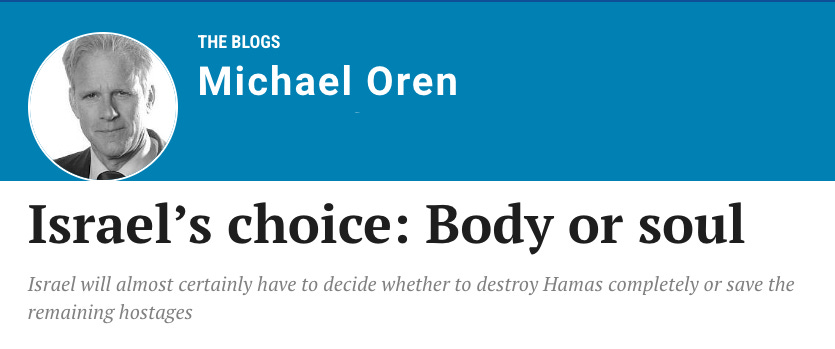Today marks a week since the “cease-fire” (a contested term in Israel) began—the first hostages came home last Friday night. At this moment, at least, the cease-fire is slated to end today. Unless something dramatic changes, no more hostages will come home tonight, and the fighting will likely resume.
Yesterday, I had the pleasure of speaking with Yaakov Katz, former editor of the Jerusalem Post and now Senior Fellow at JPPI, the Jewish People Policy Institute, and Professor Yedidia Stern, President of JPPI. Our conversation, which took place as part of JPPI’s “Israel at War—Daily Analysis” series, covered a wide range of topics. Two of them, though, got the bulk of our time—what should Israel do should it have to decide between destroying Hamas and getting the hostages back, and how might this current crisis shape or color relations between American Jews and Israel in the years to come.
The clip above is a brief portion of the “American Jews and Israel” section of our discussion—the entire conversation can be watched on YouTube below.
And below that, two more columns, one by Yedidia Stern and one by Ambassador Michael Oren, about the agonizing “Hostages or Hamas’ Destruction” choice Israel may well have to make. Stern explains why our soul is also our Achilles Heel, while Oren believes that a moment from Israel’s history in Lebanon may afford us another option we haven’t considered.
In the Youtube video above, Professor Yedidia Stern makes mention of a somewhat controversial column he wrote this week in Yediot Achronot. An automated Google translation of the column now follows:
We are all overwhelmed and chained to an emotional roller coaster that every piece of information about which of the captives shakes her wildly. This is who we are: guarantors to each other, not leaving anyone behind, partners in a fateful alliance that is being tested these days. The whole country cried as a Monder fan ran towards his father. This is who we are - one heart. And we are proud of that.
But victory in war cannot be achieved through tears. Israel is a civilian and military power, and Hamas is the weakest of our enemies. And now more than 50 days have passed since the terrible Sabbath; The Israeli muscle was mobilized with an impressive determination that we almost forgot existed in us; The soldiers (and more amazingly - the members of their families) are willing to continue the mission until a decision is made; The strongest power in the world supports us in an unprecedented way; We conquered the surface of half the strip and destroyed it; And yet - Hamas is not only not broken, but it continues to dominate the narrative of the war. An entire nation is holding its mighty army and its breath in anticipation of the decisions of Yahya Sinwar, the Bibim terrorist. And no - this is not a surprise, but a predictable result. How?
Israel is Achilles, the mythological Greek hero: like him, she is strong and no one can defeat her; But like him, she has a weakness - "Achilles' heel" - that whoever targets her can overwhelm her. Sinwar and his friends were released from the Israeli prison because their predecessors shot an arrow in the Israeli heel: they managed to capture one Israeli soldier, Gilad Shalit, "the child of all of us", and thus undermined the Israeli mental fortitude: more than 1,000 terrorists were sent free to plan the death trap around Gaza.
Sinwar once again aims the arrow at the Israeli Achilles' heel. In his understanding, his opening move - dragging babies, children, women and old men into the Gaza camps - guarantees his victory. Israel can empty its weapons warehouses on Gaza and turn it into a city of ruins; kill thousands of terrorists; Eliminate Hamas battalion and brigade commanders - but the victory will be Hamas's, if at the end of the day the public pressure of the Israelis on the leadership to return the abductees "at any cost" leads to a cessation of hostilities before the war's goals are fully realized.
Sinwar rubs his hands with pleasure at the Israeli broadcasts, the opinion articles, the heartbreaking ads, the demonstrations that push the slogan "now". He understands very well that the Israeli public is unable to deal with the POW issue. Although the leaders promise us that we will return to the war after the deal and that the current deal aims to bring home as many hostages as possible without giving up on the defeat of Hamas, but is that how they will act in practice? I am afraid that the pressures from the outside, which will increase greatly, and more importantly - the pressures from the inside not to leave a single hostage in the hands of the enemy, will signal Israeli determination. The trailer is already flickering on the screens live.
But this time the price may be much more significant: if this time too Israel does not defeat Hamas in such a way that it ceases to exist in the Gaza Strip, Israel will lose the most important asset for its future: the power of deterrence against its enemies. Unlike Hamas, which is not an existential threat, the loss of deterrence is an existential threat.
If it were possible to use logic, in a place where emotion is overwhelming, we would understand that the call to release the abductees must be rejected at all costs. This is an understandable reading - we recognize the abductees by name and their picture, so there is no way to contain their "promiscuity" God forbid (once again, after the promiscuity on the horrible Shabbat), but it is a wrong reading. It could mean that many, currently anonymous, will pay with their lives in a war that will break out due to the loss of deterrence. The State of Israel must act with all its might to return the abductees, including risking the lives of soldiers in bold actions (per Entebbe), but it must not avoid a total decision by Hamas to return the abductees home.
Jewish tradition states that "You have no greater mitzvah than redeeming captives" (Rambam) and "Every moment that is late in redeeming captives... is as if blood were shed" (Shulchan Aruch). The story of our foundation, the Exodus, deals with the redemption of the entire nation from captivity to freedom. These are the deep foundations of the wonderful mutual guarantee that is inherent in us. But the tradition also states that "captives should not be redeemed more than their likenesses, because of tikkun olam" (mishna). In other words: although ransoming captives is a supreme value, it is not an absolute value. Willingness to redeem captives At "any price", even though it is noble, it harms the repair of the world. And in the current context - it could collapse the Israeli deterrence.
Although the heart is crushed at the reading of the words, it is important to say clearly: the mutual guarantee is an important asset for strengthening national security, but it does not exhaust it. Even if the general Israeli public finds it difficult to accept this, this is the supreme test of the Israeli leadership: if it turns out that Israel will not be able to achieve the two goals of the war - the defeat of Hamas and the release of all the abductees - and will have to choose between them, will it be able to withstand public pressure? Can we prove Sinwar wrong about us? Will Achilles realize his power?
And finally, as mentioned above, we recommend Ambassador Michael Oren’s column in the Times of Israel on the agonizing issue of what Israel should do should it have to choose between getting the remaining hostages back and destroying Hamas. His column appeared here.
If you’re just joining us, Israel from the Inside typically posts a written column on Mondays and a podcast on Wednesdays. That is obviously irrelevant for the time being.
We’ve delayed all the podcasts that were ready to go, because the people whose stories they tell deserve to tell them when we all have the bandwidth to hear. Hopefully, that will return some day.
In the interim, we’ll post as possible. Here in Israel, there are non-stop funerals to go to, shiva homes to visit, grandchildren to help care for while sons and daughters are in the army, so we’ll see.
Schedules are the least of our worries.
Impossible Takes Longer is available on Amazon and Barnes & Noble and at other booksellers.
Our Threads feed is danielgordis. We’ll start to use it more shortly.























If Israel has to choose between the hostages and winning the war; and how liberal American Judaism's most fundamental strategy failed